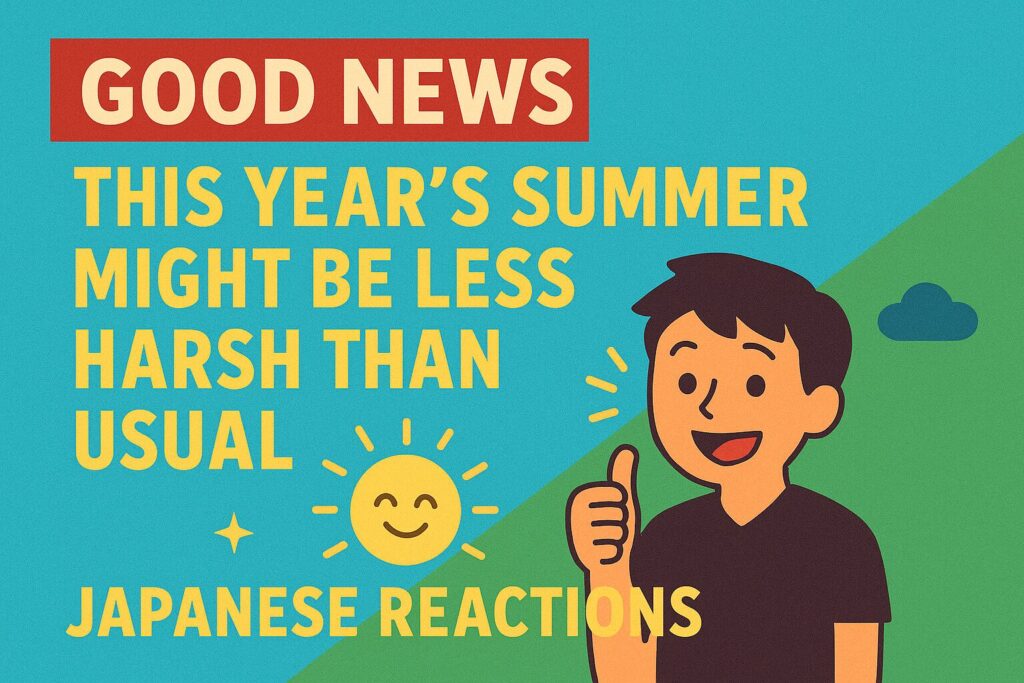
This Year's Summer Might Be Less Harsh Than Usual
2. 名無しさん@おーぷん
嬉しい嬉しい?
So happy, so happy?
| JP Phrase | EN | Explanation |
|---|---|---|
| 嬉しい | happy | Basic adjective expressing joy or gladness |
| 嬉しい | happy | Repeated for emphasis (casual tone) |
| ? | ? | Question mark indicating rhetorical tone or emphasis |
3. 名無しさん@おーぷん
確かに今月けっこう涼しい日多くない?去年に比べて
Come to think of it, aren’t there quite a few cool days this month compared to last year?
| JP Phrase | EN | Explanation |
|---|---|---|
| 確かに | indeed | Used to express agreement or realization |
| 今月 | this month | The current calendar month |
| けっこう | quite | Used for moderate emphasis |
| 涼しい | cool | Describes comfortable temperature |
| 日 | days | Refers to individual days |
| 多くない | aren’t there many | Negative question asking for confirmation |
| 去年 | last year | The year before this one |
| 比べて | compared to | Used to make comparisons |
4. 名無しさん@おーぷん
ええや〜ん
Sounds good!
| JP Phrase | EN | Explanation |
|---|---|---|
| ええ | good | Kansai dialect version of “いい” (good) |
| や〜ん | (casual emphasis) | Kansai dialect ending to emphasize feeling |
5. 名無しさん@おーぷん
言って毎日三十度は超えるんやろ
Still, it’s probably going to go over 30°C every day, right?
| JP Phrase | EN | Explanation |
|---|---|---|
| 言って | realistically | Colloquial usage meaning “to be honest” or “realistically” |
| 毎日 | every day | Occurs daily |
| 三十度 | 30 degrees | Temperature measurement |
| は | (topic marker) | Marks the topic of the sentence |
| 超える | exceed | To go beyond a threshold |
| んやろ | right? | Kansai dialect ending expressing assumption or confirmation |
6. 名無しさん@おーぷん
地元の週間予報見ても去年より暑い日ないし
嬉しすぎる
Even looking at my local weekly forecast, there aren't hotter days than last year. I'm so happy.
| JP Phrase | EN | Explanation |
|---|---|---|
| 地元 | local | Refers to one’s hometown or area |
| 週間予報 | weekly forecast | Weather prediction for the coming week |
| 見ても | even if I look | Concessive form meaning “even though” |
| 去年 | last year | The previous calendar year |
| より | than | Used for comparison |
| 暑い日 | hot days | Refers to days with high temperature |
| ないし | none | Colloquial ending meaning “there are none” |
| 嬉しすぎる | too happy | “すぎる” indicates excess |
9. 名無しさん@おーぷん
これでも地球は間氷期という事実
Even now, the Earth is technically in an interglacial period.
| JP Phrase | EN | Explanation |
|---|---|---|
| これでも | even now | Indicates a contrast with expectations or surprise |
| 地球 | Earth | Our planet |
| 間氷期 | interglacial period | Warm period between ice ages |
| という | called / known as | Used to define, name, or quote something |
| 事実 | fact | Something objectively true |
7. 名無しさん@おーぷん
今年の夏は去年よりかは野菜安くなるとええんやが
I hope vegetables will be cheaper this summer than last year.
| JP Phrase | EN | Explanation |
|---|---|---|
| 今年 | this year | The current calendar year |
| 夏 | summer | The hot season of the year |
| 去年よりかは | than last year | Casual comparison phrase |
| 野菜 | vegetables | Edible plants like cabbage, carrots, etc. |
| 安くなる | become cheaper | Verb phrase indicating price reduction |
| と | if | Conditional particle used before expressing a wish or result |
| ええ | good | Kansai dialect version of “いい” (good) |
| んやが | I hope | Kansai dialect phrase expressing hope or concern |
12. 名無しさん@おーぷん
この数年の暑さで「未来の子供かわいそうすぎる、もう人類全員死んだ方が幸せなのでは?」って思ってたけど
ちょっと希望出てきたやん
Because of the heat in recent years, I was thinking, “Poor future kids, maybe all of humanity would be better off dead,” but now there’s a bit of hope!
| JP Phrase | EN | Explanation |
|---|---|---|
| この数年 | these past few years | Time expression covering recent years |
| 暑さで | because of the heat | Indicates cause using “で” particle |
| 未来の子供 | future children | Children in the future |
| かわいそうすぎる | too pitiful | “すぎる” indicates excess; expresses sympathy |
| 人類全員 | all of humanity | Collective term for all people |
| 死んだ方が幸せ | better off dead | Hyperbolic pessimism |
| って思ってたけど | I was thinking but | Colloquial quote + contrast |
| ちょっと | a little | Small degree; slight |
| 希望 | hope | Positive outlook or possibility |
| 出てきた | emerged | Something becoming apparent |
| やん | (Kansai emphasis) | Colloquial/emphatic ending |
13. 名無しさん@おーぷん
ゴキ「よかった…」
Cockroach: “Thank goodness…”
| JP Phrase | EN | Explanation |
|---|---|---|
| ゴキ | cockroach | Abbreviation of ゴキブリ (cockroach), often used humorously |
| よかった | thank goodness | Past tense of “いい” (good); expresses relief |
14. 名無しさん@おーぷん
でも地球温暖化は進んでるし結局暑いやろ
But global warming is still progressing, so it'll be hot anyway.
| JP Phrase | EN | Explanation |
|---|---|---|
| でも | but | Conjunction introducing contrast |
| 地球温暖化 | global warming | Rising average temperature of Earth’s climate |
| は | (topic marker) | Marks the topic of the sentence |
| 進んでる | is progressing | Colloquial form of “進んでいる” (continuing) |
| し | and / also | Used to give reasons or list multiple things |
| 結局 | in the end | Ultimately / eventually |
| 暑い | hot | Describes high temperature |
| やろ | right? | Kansai dialect ending for confirmation |
15. 名無しさん@おーぷん
嘘つけどうせ40近くまで上がる
Liar—it's gonna go up to near 40°C anyway!
| JP Phrase | EN | Explanation |
|---|---|---|
| 嘘つけ | liar / no way | Colloquial and aggressive way to express disbelief |
| どうせ | anyway / after all | Used when expecting a negative result |
| 40近く | close to 40 | Approximation of a numerical value |
| まで | up to | Indicates extent or limit |
| 上がる | rise | To go up or increase |
16. 名無しさん@おーぷん
そういう日もあるだろうが40℃近くに達する日が減るって言うのがワイの予想
There might be days like that, but I think the number of days hitting near 40°C will go down.
| JP Phrase | EN | Explanation |
|---|---|---|
| そういう日 | those kinds of days | Generalization of certain types of days |
| も | also | Inclusive particle meaning “too” or “as well” |
| あるだろう | might exist | Expressing probability with “だろう” |
| が | but | Conjunction indicating contrast |
| 40℃近く | near 40°C | Approximating temperature |
| 達する | reach | To hit a target or number |
| 日 | day | Specific day in reference |
| 減る | decrease | To go down in number or amount |
| って言う | say / think | Colloquial form used for quoting thought or speech |
| のが | that is | Nominalization structure |
| ワイ | I (me) | First-person slang (from English “Y”) |
| 予想 | expectation | Prediction or guess |
17. 名無しさん@おーぷん
この15年くらい涼しい夏なんてなかった気がする
I feel like we haven’t had a cool summer in the past 15 years.
| JP Phrase | EN | Explanation |
|---|---|---|
| この15年 | these 15 years | Refers to a time span of 15 years |
| くらい | about | Used for approximate quantity |
| 涼しい | cool | Describes mild or pleasant temperature |
| 夏 | summer | Warmest season of the year |
| なんて | such as | Emphasizes or devalues what's referred to |
| なかった | did not exist | Negative past of “ある” |
| 気がする | I feel like | Phrase used to express one’s impression or sense |
18. 名無しさん@おーぷん
実際花粉軽いからな今年
Actually, pollen was light this year.
| JP Phrase | EN | Explanation |
|---|---|---|
| 実際 | actually | Emphasizes that something is true in reality |
| 花粉 | pollen | Allergenic particles from plants |
| 軽い | light | Low in severity or amount |
| から | because | Indicates cause or reason |
| 今年 | this year | The current calendar year |
19. 名無しさん@おーぷん
今年確かにマシだったわ
This year was definitely better.
| JP Phrase | EN | Explanation |
|---|---|---|
| 今年 | this year | The current year |
| 確かに | indeed | Used for agreement or acknowledgment |
| マシ | better | Colloquial word meaning “tolerable” or “not as bad” |
| だった | was | Past tense of “です” |
| わ | (emphasis particle) | Used for soft assertion, often by women |
20. 名無しさん@おーぷん
ワイ釣り人、めっちゃ嬉しい
黒潮の動きで魚が釣れんとかそういう話題あったもんなぁ
As a fisherman, I’m super happy. There were even talks about how fish couldn’t be caught because of the Kuroshio current’s movement.
| JP Phrase | EN | Explanation |
|---|---|---|
| ワイ | I | Slang for “I” (used in forums, Kansai dialect) |
| 釣り人 | fisherman | Person who fishes |
| めっちゃ | super | Very informal version of “very” |
| 嬉しい | happy | Feeling joy |
| 黒潮 | Kuroshio current | Warm ocean current near Japan |
| 動き | movement | Change in position or flow |
| で | because of | Particle showing cause |
| 魚 | fish | Sea creatures caught when fishing |
| 釣れん | can’t catch | Negative form of “釣れる” (to be able to catch) |
| とか | or things like | Used for listing examples casually |
| 話題 | topic | Subject of discussion |
| あった | there were | Past tense of “ある” (to exist) |
| もん | (casual emphasis) | Used to give reasoning in casual speech |
| なぁ | (soft ending) | Sentence ending for reflection or emotion |
今年の夏は厳しい暑さが少し和らぐ可能性が出てきました
Quoted under Article 32 of the Copyright Act of Japan from the thread
“今年の夏は厳しい暑さが少し和らぐ可能性が出てきました”
https://news.yahoo.co.jp/articles/e14b9aeaf808337e490b10093dcadbc228bc711c
for the purpose of commentary and language education.

【朗報】 (rōhō, “good news”) is a headline-style tag used in Japanese social media and forums. Placed at the start of a post or tweet, it signals “Great news ahead!” and grabs readers’ attention—much like “BREAKING: Good news” in English click-bait titles. A common counterpart is 【悲報】 (“bad news”), which flags disappointing updates. Both tags are written inside the distinctive corner brackets to stand out on feeds.
1. 名無しさん@おーぷん
https://news.yahoo.co.jp/articles/e14b9aeaf808337e490b10093dcadbc228bc711c
今年の夏は厳しい暑さが少し和らぐ可能性が出てきました。
This year's summer might be slightly less harsh.
その理由は、7年以上続いた「黒潮大蛇行」の変化。魚の値段にも影響が出るかもしれません。
The reason is the change in the “Kuroshio meander” that continued for over 7 years. It might affect fish prices too.
嬉しすぎるんやが
I'm way too happy about this.
25/05/14(水) 17:16:42 ID:iQ9N